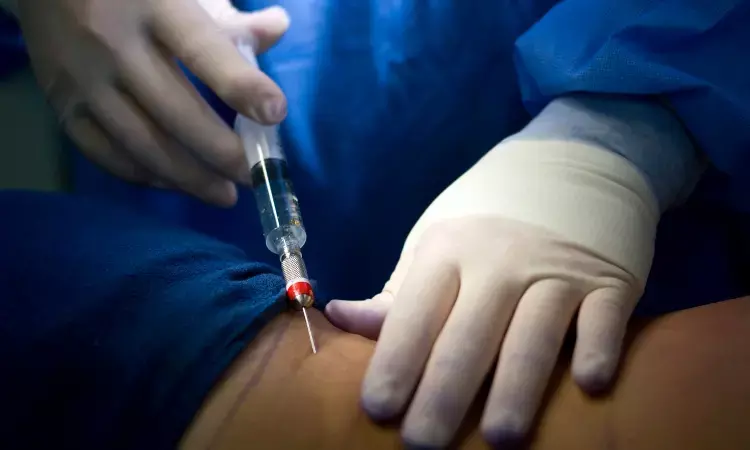- Home
- Medical news & Guidelines
- Anesthesiology
- Cardiology and CTVS
- Critical Care
- Dentistry
- Dermatology
- Diabetes and Endocrinology
- ENT
- Gastroenterology
- Medicine
- Nephrology
- Neurology
- Obstretics-Gynaecology
- Oncology
- Ophthalmology
- Orthopaedics
- Pediatrics-Neonatology
- Psychiatry
- Pulmonology
- Radiology
- Surgery
- Urology
- Laboratory Medicine
- Diet
- Nursing
- Paramedical
- Physiotherapy
- Health news
- Fact Check
- Bone Health Fact Check
- Brain Health Fact Check
- Cancer Related Fact Check
- Child Care Fact Check
- Dental and oral health fact check
- Diabetes and metabolic health fact check
- Diet and Nutrition Fact Check
- Eye and ENT Care Fact Check
- Fitness fact check
- Gut health fact check
- Heart health fact check
- Kidney health fact check
- Medical education fact check
- Men's health fact check
- Respiratory fact check
- Skin and hair care fact check
- Vaccine and Immunization fact check
- Women's health fact check
- AYUSH
- State News
- Andaman and Nicobar Islands
- Andhra Pradesh
- Arunachal Pradesh
- Assam
- Bihar
- Chandigarh
- Chattisgarh
- Dadra and Nagar Haveli
- Daman and Diu
- Delhi
- Goa
- Gujarat
- Haryana
- Himachal Pradesh
- Jammu & Kashmir
- Jharkhand
- Karnataka
- Kerala
- Ladakh
- Lakshadweep
- Madhya Pradesh
- Maharashtra
- Manipur
- Meghalaya
- Mizoram
- Nagaland
- Odisha
- Puducherry
- Punjab
- Rajasthan
- Sikkim
- Tamil Nadu
- Telangana
- Tripura
- Uttar Pradesh
- Uttrakhand
- West Bengal
- Medical Education
- Industry
Higher prevalence of occult hypoxemia found during anesthesia in Black patients compared to White patients

Background about the condition: Pulse oximeters are one of the most commonly utilized medical devices and a standard intraoperative monitor for patients under anesthesia. Studies have provided mixed results on the impact of dark skin pigmentation on pulse oximeter accuracy, but one recent study demonstrated a higher prevalence of unrecognized low oxygen levels in the blood despite normal pulse oximeter values in hospitalized patients. This has never been investigated in patients under anesthesia, but is important as pulse oximeter values impact patient care included removal of a breathing tube at the end of surgery or where the patient goes following surgery (e.g., home, recovery room, critical care unit).
What is the paper about: This large retrospective cohort study evaluated patients at a single center under anesthesia for surgery. All patients who had a measurement of blood oxygenation (e.g., arterial blood gas) during surgery were included in the study and their measured blood oxygen saturation was compared to their pulse oximeter reading at the same time. The primary outcome was occult hypoxemia, or a measured blood oxygen saturation (SaO2) < 88% despite a pulse oximeter reading (SpO2) > 92% as stratified by self-reported race/ethnicity. The study found the prevalence of occult hypoxemia to be significantly higher in Black (2.1%) and Hispanic (1.8%) patients when compared to White patients (1.1%), even after adjusting for other patient factors.
Bottom Line: Self-reported Black and Hispanic race/ethnicity is associated with a greater prevalence occult hypoxemia when compared to White race/ethnicity.
Why the research is important: Demonstrating this discrepancy illustrates that racial/ethnic disparities exist and should be considered when caring for patients of color. Further validation of pulse oximeters in patients of color are required to further address this problem.
Said Dr. Garrett W. Burnett about the study: Previously, discrepancies in pulse oximeter performance in patients of color were thought to be at lower oxygen saturation levels. More recently, including in the present study, evidence for pulse oximeter discrepancies at higher levels in patients of color have been demonstrated. This is a problem with potentially far reaching consequences due to the vital role pulse oximeters play in modern healthcare. Further research to investigate and address this problem is required.
Dr Kamal Kant Kohli-MBBS, DTCD- a chest specialist with more than 30 years of practice and a flair for writing clinical articles, Dr Kamal Kant Kohli joined Medical Dialogues as a Chief Editor of Medical News. Besides writing articles, as an editor, he proofreads and verifies all the medical content published on Medical Dialogues including those coming from journals, studies,medical conferences,guidelines etc. Email: drkohli@medicaldialogues.in. Contact no. 011-43720751


